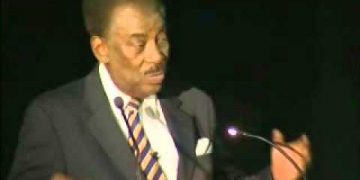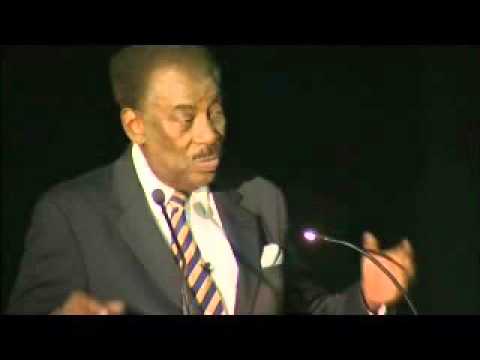By Kamal Persad- Issued 2021
Professor Courtenay Bartholomew has articulated his deep concern about the decline of the black professional class in Trinidad over recent years in a lengthy commentary published as two articles in the Sunday Express (21stNovember, 2005 pp. 1 and 3 Lifestyle Section), One had expected that this would have opened up a discussion on the topic of the rise, and alleged fall of Afro-Trinidad professional class in contemporary Trinidad, especially so, since the issue was raised by a distinguished and prominent individual in the country. Instead, there was silence. A few letters to the editor appeared on the issue.
The only exception was the response of Mr. Balgobon Ramdeen, attorney –at-law and former member of Parliament (1966-71) of the then opposition Democratic Labour Party (DLP). His reply was published, not in the Express as it should have been carried, but in the weekly TNT Mirror (January 6, 2006 pp. 12 and 13).
Dr. Courtenay’s Concern at a Personal Level
Prof. Barth is particularly concerned about the decline of the Afro-Trinidadian professional because he is “a student and lover of history, especially medical history.” He has been surveying, over the past few years, the contemporary situation as it relates to the black presence in the medical professions in general. In his view, what has emerged is a very disturbing picture and a cause for deeper concern. So much so that hr decided to publish his views on the issues.
There is also the subjective factor in the history of medical education of which he was a part, hence: “I am so concerned about the ethnic imbalance in the medical profession…simply (and justifiably so) because I have been the first lecturer and professor of the School of Medicine in Trinidad and Tobago.” And this at an enormous sacrifice, he informed his readers, in turning down two foreign positions as consultant specialist in the Royal Victoria Hospital of McGill University, Montreal, Canada. Later he declined the unsolicited appointments as Medical Director of the United Nations in New York in June 1969 with US tax-free salary which was very attractive, even though it was difficult to refuse the offer. There were also family considerations: “I did not want to bring up my children in New York.
Dr Bartholomew stated that he made a great personal sacrifice “to accept an urgent offer from Jamaica in 1967 to return to Trinidad to co-start a new medical school…The utopian and challenging vision of being a foundation lecturer in medicine in a new multi-racial medical school in my country was much more attractive to me, irrespective of the vast financial y of Medicine, St Augustine Campus of the West Indies (UWI), and by extension”
Indian vs Multi-ethnic Medical Faculty – A Vision in Crisis
Today, Dr. Bartholomew is very concerned about the ethnic imbalance in the student population at the Faculty of Medicine, St. Augustine Campus of the University of the West Indies (UWI), and by extension in the medical professions in the country: “Over the years, the dream of the multi-ethnic and Caribbean flavoured faculty, which we, the first lecturers had, began to fade and the percentage of Afro-Trinidadian students progressively declined.” This state of affairs, for Prof. Bartholomew, is clearly unacceptable. Clearly, the vision of the founders of UWI medical faculty with respect to the creation of a local professional class has gone awry because of the dominance of Indian students in this faculty and in other faculties at UWI. While he did not say it, he painted a picture of crisis because of the decline in the number of black medical students at UWI, and the number graduating each year. The professionals emerging from St Augustine Campus of the University of the West Indies, especially in the medical professions, are predominantly Indians. It is for this reason the Prof. Courtenay Bartholomew, a professor emeritus of UWI medical school, has decided to put pen to paper and make this issue public, to attempt an analysis of cause of the black decline in medicine and make recommendations.
Dr, Bartholomew provided the data on the ascendancy of the Indian-Trinidadian professional class in contrast to the decline of the Afro-Trinidadian professional. The key to the professions is education and more particularly, tertiary education. He pointed out:
“Unlike the days of yore, hundreds of scholarships are awarded today and Indo-Trinidadians have specifically dominated the medical fraternity. Indeed, at the last UWI graduation ceremony two weeks ago, 70 per cent of the graduant doctors were Indo-Trinidadians and one was Chinese. The Afro-Trinidadian minority was strikingly marked. But this has been so for years now. Moreover, 45 of the 55 new applicants selected for entrance into the Faculty of Medical Sciences this year are Indo-Trinidadians and, for the School of Dental Surgery, only one of six admissions is an Afro-Trinidadian. In addition, as another example, 15 of the 20 who received post graduate diplomas in petroleum engineering were Indo-Trinidadian.”
Dr. Bartholomew suggested an explanation for this situation, that it has to do with the obvious reason that “the Indo- Trinidadian is studying harder, particularly in these disciplines… but there may be other social reasons.” The other social reasons for the ascendancy of the Indian-Trinidadians in the professional fields were not analyzed, and more so, in contrast to Afro-Trinidadians. He did not state, however, the “truism that these are the fields which ensure higher income in later life.”
He dismissed outright what we view as a racist position “that because the Indo=Trinidadian has a better brain (scientific or otherwise) than the Afro-Trinidadian…Indeed, there is enough evidence that there is no superiority in brain power any of the various ethnic groups in Trinidad and Tobago.” He recalled that one medical ex-politician “had the imprudence and impudence to say to me exactly ten years ago” just this, but he is certain that this obviously Indian medical ex-politician was “not representing the viewpoint of his (Indian) community.” He is, however, critical of Mayor of Chaguanas, Suruj Rambachan, who, he reminded, was once lecturer of UWI, for “boasting” that Indians are “dominating the professions” and which a “bit disturbing.”
Dr. Bartholomew carried his ethnic/African contrast to other regions of the world:
“In fact, an any part of the world where there is an Indian and African population (for example, Kenya, Unganda, London, Washington) the Indians have always been the merchant and businessmen and the African consumers. They certainly have a genetic flair and cultural tradition and expertise in trade and business. Unfortunately, the Afro-Trinidadian does not appear to be interested in our have the disposition for that important economic arena.”
A while he lists Afro-Trinidadian contributions in local and Caribbean culture, in sports (other than in cricket) where “they clearly dominate the field (even now with airline taickets in hand to Germany),” the arts and theatre, music and musical inventions such as the pan, calypso, Olympic medalists and beauty pageant successes, these he place in contest of hard economics: “Unfortunately, in most instances all these varied talents do not bring home sufficient money to purchase the “cottage for sale” or, at time to afford sending their children to universities here or abroad. But this is only part of the problem.” It is the professions which “ensures much higher income in later life,” He recalled the 1945 advice of his dear, but but very unhappy mother, who did not speak to him for an entire month when he performed poorly at St. Mary’s College because of his focus on sports instead of studies, and was promoted form 3A Special to 5A Special instead of 5A Special: “Son, try to get your ‘paper’ first before spending mich time on sport,”
(To be continued)



































































